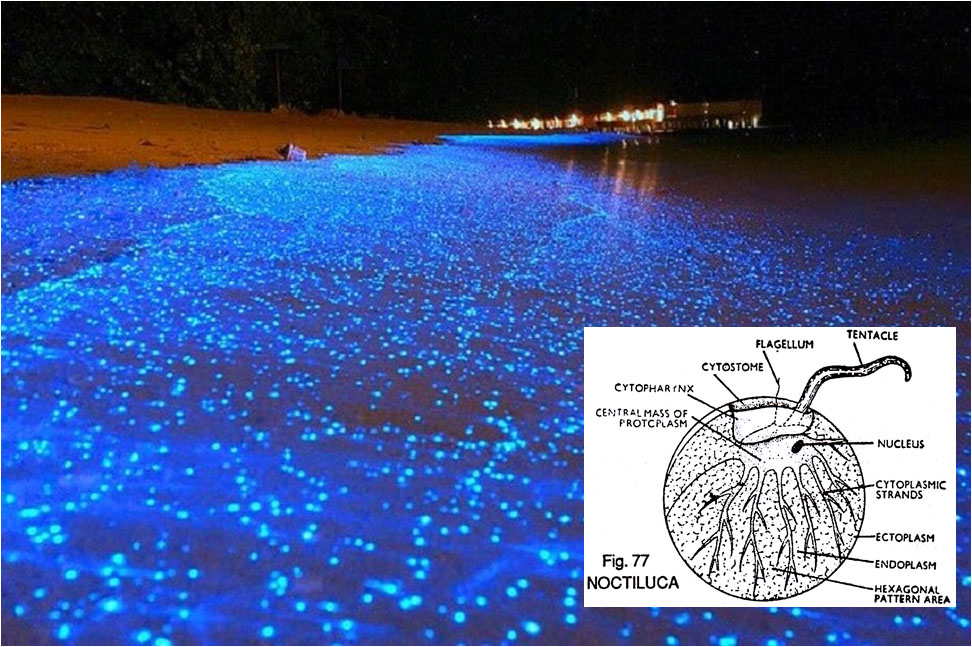Excellent study material for all civil services aspirants - begin learning - Kar ke dikhayenge!
THE CURIOUS CASE OF THE GLOWING BEACHES
Read more on - Polity | Economy | Schemes | S&T | Environment
- Sparkling waves: In December 2020, from various parts of the Arabian sea coastline, sparkling waves were reported! The blue-green glitter was actually bioluminescence. The visual impact is magical.
- The danger: These waves come packed with swarms of jellyfish, including species that are toxic. Many tourists would be stung badly, needed medical attention. Innumerable creatures are regularly washing ashore daily even now, in beaches of Goa.
- Oceans not healthy: The beauty and danger - sea glitter and jellyfish - are reminders that world's oceans are not healthy, due to broader trends of planetary climate change.
- It starts with dwindling oxygen levels in Arabian sea, or hypoxia (due to various reasons)
- Sewage from megacities and reduction in freshwater flows due to Himalayan snow cover reduction are main culprits
- This directly allows "sea sparkle" Noctiluca scintillans (malodorous, bioluminescent) to grow
- That pushes the population of jellyfish and salps, breaking the sea's food chain
- What's now happening on Konkan and Malabar coasts shows a perfect storm of fallouts of climate change
- The tipping point: Experts say that the Arabian sea ecosystem may be beyond the point of repair now. Books have been published talking of the loss of health due to snow cover change in Himalayan-Tibetan plateau region. It's now that India is facing it, as so far the focus on other ends of the Arabian Sea. Industries in Oman have been choked by jellyfish (refineries, desalination plants, etc.). In Yemen and Somalia, Noctiluca blooms have strangled fish supplies, worsening food security, and social destabilisation.
- Danger has reached Indian shores: Experts are warning that there is a huge threat that fisheries along Indian coasts would be hit, thereby washing away hard-won economic gains of the past. What pandemic did to the US, Noctiluca blooms may do to India.
- Food chains are being short-circuited. With blooming of Noctiluca, apex predators are not fish but swarms of jellyfish and salps.
- These swarms can hit fisheries, tourism and industrial plants. It's endgame.
- Functional anoxia: It is the long-term lack of enough oxygen to maintain normal ocean biodiversity, in the Arabian sea. In such conditions, nothing other than Noctiluca seems to survive. There is a regime shift in Arabian sea coastline waters, with the OMZ expanding fast (Oxygen Minimum Zone). Oxygen saturation in sea water is at its lowest. That hits fisheries and marine biospheres as stores of CO2.
- Functional anoxia means anoxic microbial processes take over, which is rare in oceans
- It's common in marine sediments and mangrove soils
- Mass mortality events will commence, and most fish will die en masse.
- Two factors: These two things have come together and taken the ecosystem beyond tipping point.
- Sewage flows: Every day, Mumbai and Karachi release thousands of millions of litres of untreated waste into the Arabian Sea. Others do so too. Goa's NIO had warned in 2011 that all coastal waters and rivers had been polluted with E-coli (faecal) bacteria. Swimming was unsafe.
- Climate change's dynamic: Global warming is hitting Eurasian land surface hard, reducing the snow cover in Himalayan-Tibetan region. So winter connectivity mixing is down which is needed for marine biodiversity.
- Learning about Nauctiluca: Scientists now want to learn all about this organism, otherwise it won't be possible to manipulate the situation back to the natural flora of marine ecosystems. Researchers found that jellyfish feed on mesozooplankton, thereby giving Nauctiluca scintillans a chance to flourish by feeding on diatoms (with less competition). Then jellyfish eat them, leading to swarms. The food chain is disrupted.
- Overall scene: The Arabian sea ecosystem is now facing habitat loss, debris accumulation, microplastic pollution increase, harmful algal blooms etc. The resilience to spring back to normalcy is under question.
- To resolve problem of eutrophication and pollution, social-economic conditions have to change
- Global warming impacts anyway may not be reversible now, as oceans respond slowly to changes in atmospheric temperature (so regime shifts may not happen at all, even if warming is stopped under Paris deal)
- [Eutrophication - accumulation of sediments, minerals and nutrients]
- Summary: Without drastic action, entire monsoon chain is likely to be disturbed, and fisheries may not recover either. Time for action is now, for the sake of India's food security.
* Content sourced from free internet sources (publications, PIB site, international sites, etc.). Take your own subscriptions. Copyrights acknowledged.

















COMMENTS